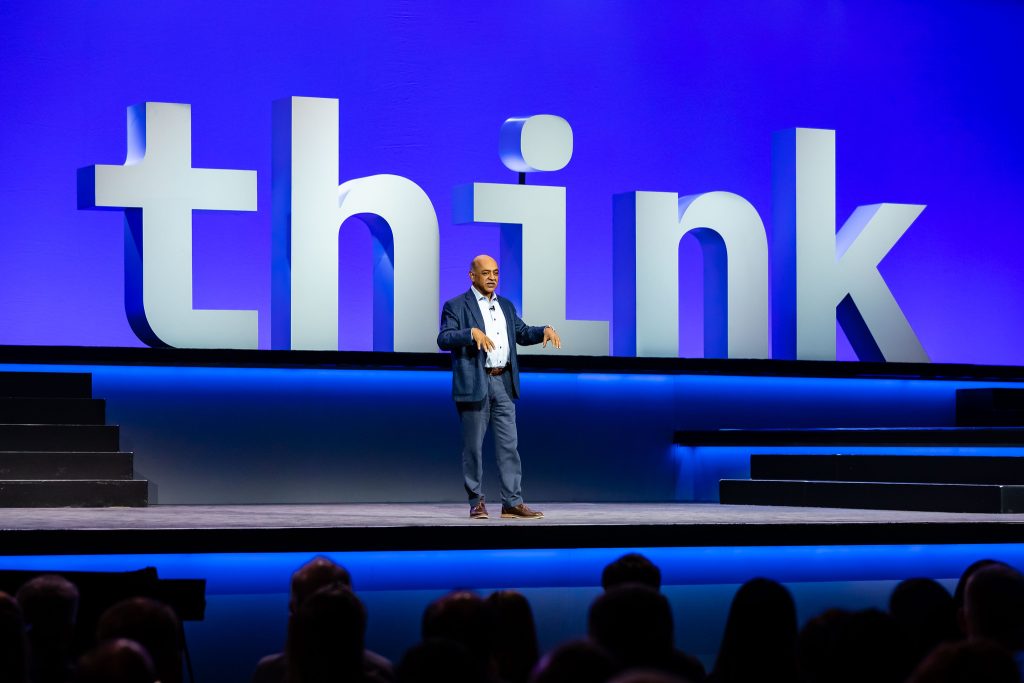
Regulation on Artificial Intelligence Innovation is Dumb, Says IBM CEO
Is IBM’s CEO flip-flopping on the impact of artificial Intelligence on jobs? What are his thoughts on AI regulation? In an interview with Bloomberg last month, IBM’s CEO Arvind Krishna said his company would slow or suspend hiring because he expects about 30% of nearly 26,000 positions could be replaced by AI over a five-year period at his company, that was calculated as 7,800 supplanted by AI. In a new interview this month with Barron’s, Krishna addresses the expected impact on jobs and makes light of the idea that humanity is at great risk from AI technology.
Spoiler Alert, AI is Good
AI will actually create, not destroy jobs – and it is not going to destroy the world. This is the view of IBM’s CEO Krishna, discussing artificial Intelligence in a feature with Barron’s published in the most recent Tech Trader column.
Addressing AI job loss, which he has been quoted as expecting, at least for IBM, the blue-chip CEO says he’s somewhat irritated about a recent flurry of news stories that quoted him as saying that IBM could replace 7,800 workers with AI software. Krishna says his comments were taken out of context. He tried to set the record straight explaining, that he actually said was that over the next five years, 30% to 50% of repetitive white-collar jobs could be replaced by AI. He also added the bottom end of the range was most likely. The number used in the reporting came from his response to a follow-up question with the Bloomberg reporter. Krishna was asked how many IBM employees meet the description, he estimated 10%. The math, based on IBM’s workforce, was used to come up with 7,800 employees.
The IBM CEO says the calculation left out another key piece of information.
“I also said that AI is going to create more jobs than it takes away,” Krishna said, “the same way that the agricultural revolution and the services revolution created way more jobs than those that got taken away.” He says we will need new “prompt engineers” to lever AI tools, and more fact-checking to address the accelerated creation of misinformation that he thinks will inevitably accompany the creation of AI tools.
Are Their AI Risks?
On humanity’s risks from AI and potential regulation, the IBM CEO explained, the assertion by some that AI represents an existential threat to humanity—that there’s a risk that AI gets smarter than humans, and then somehow wipes us off the face of the Earth, is bunk – or highly unlikely.
“I’m not there fundamentally,” he said. “It seems like a pretty big stretch. These things are great at memorization and pattern matching. They don’t yet have a knowledge representation. They don’t have any symbolic manipulation. They do math by memory, not by understanding math. There are a lot of things that are yet to be done,” said Krishna.
It was noted in the interview that some people are using nightmare scenarios to make a case for strict regulation of artificial Intelligence and machine learning. While he agrees all should be careful about how and where they use AI, he doesn’t think aggressive regulation is called for. He even believes that any US regulation would cause cheaters within the States or competitive countries, without the imposition of US regulation, to move forward as they see appropriate.
“We don’t want to have regulation on innovation. That’s dumb actually,” said Krishna. “All you are going to do is give an advantage to those who choose to ignore the regulation and those who work outside the US boundaries.”
An AI Quantum Leap?
Quantum computing is a rapidly-emerging technology that harnesses the laws of quantum mechanics to solve problems too complex for classical computers. IBM is a leader in this field. As it relates to the potential combination of AI and quantum computing Krishna thinks we are close to the day when quantum computing will mesh with AI, and open new areas of computing power.
Krishna suggested that to explore benefits of this, one might want to consider the future of the chemical and pharmaceutical industry. “Maybe we go through reading all the literature—that’s AI—and we find some gaps in knowledge,” he says. “Today you fill in those gaps by doing a wet lab experiment which might take three to six months or more. In three to five years, a quantum computer will be able to simulate those experiments and fill in the gaps in a few minutes,” he said.
A key power of quantum computing is its ability to work on vast amounts of data at the same time. Looking further out, perhaps a decade, Krishna expects that quantum computers will be able to create AI models. “Current models with hundreds of billions of parameters can take two to three months to train on a very large cluster of GPUs. With a quantum computer, you’ll be able to train the same model overnight,” he said. His expectation is, “You’ll be able to solve problems that are far beyond what the biggest supercomputers in the world can do now.”
Take Away
As part of his position as CEO of IBM, Arvind Krishna has a window seat to much of the cutting-edge changes in computing technology, including artificial Intelligence. He suggests he was not fully quoted in the article that Bloomberg did covering AI and that the technology is expected to create jobs. It may, however alter available occupations while creating new needs.
He is not in the camp that massive regulation is needed to keep the innovative technology at bay; Krishna believes creative development is best when there is a level playing field.
Managing Editor, Channelchek
Sources
https://www.barrons.com/articles/ai-stocks-dividend-ibm-99e61b50?mod=article_inline
https://www.barrons.com/articles/ai-jobs-ibm-ceo-94a6537d?mod=Searchresults